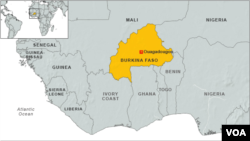"Around 100 civilians, including women and children, were believed killed in a massacre in the village of Zaongo" several days ago in the central east of Burkina Faso, a spokesman for EU foreign policy chief Josep Borrell said in a statement.
"The European Union called on the transition authorities to shed light on the circumstances of these killings to bring accountability."
Jeune Afrique, a news magazine focused on Africa, said the mass killing was carried out on November 6 by unidentified assailants.
Social media posts in Burkina Faso have shown pictures of corpses of women and children said to have been Zaongo residents.
"It is difficult to advance on the figures as the bodies were buried without any real observation," one resident told AFP.
"The massacre happened two days after fighting between security forces and terrorists. Zaongo was one of the few villages in the area not to have been emptied out by the terrorists. Some suspected the inhabitants of collaborating with them," the resident added.
The head of African Affairs at the US State Department, Molly Phee, on Friday said on X, formerly Twitter, that she was "shocked and saddened" by the news of the massacre.
"The US government condemns this attack in the strongest terms," she said, also calling for Burkina Faso's junta to investigate.
Burkinabe authorities have yet to react to the international concern being voiced.
Burkina Faso is ruled by a transitional government put in place after a September 2022 coup.
The West African country is battling a jihadist insurgency that spilled over from neighboring Mali in 2015 and has left more than 17,000 civilians and soldiers dead and displaced two million people.
The junta-led government has been conscripting men over 18 for its anti-jihadist fight.
Several civil organizations in Burkina Faso have meanwhile voiced recent concern over "requisitions" of regime opponents. According to Human Rights Watch, the requisitions apply to a dozen dissidents.
Burkinabe authorities in April opened an investigation into another massacre of 136 people — half of them women and children — in the northern town of Karma, carried out by men wearing military uniforms.
Captain Ibrahim Traore, Burkina's transitional president, said "hasty conclusions" should not be drawn about the implication of the army in the massacre.
He added that "individual freedom do not take precedence over those of the nation."







Forum